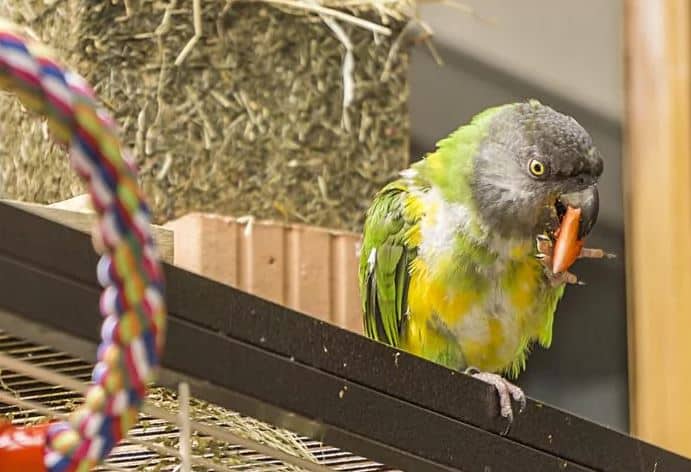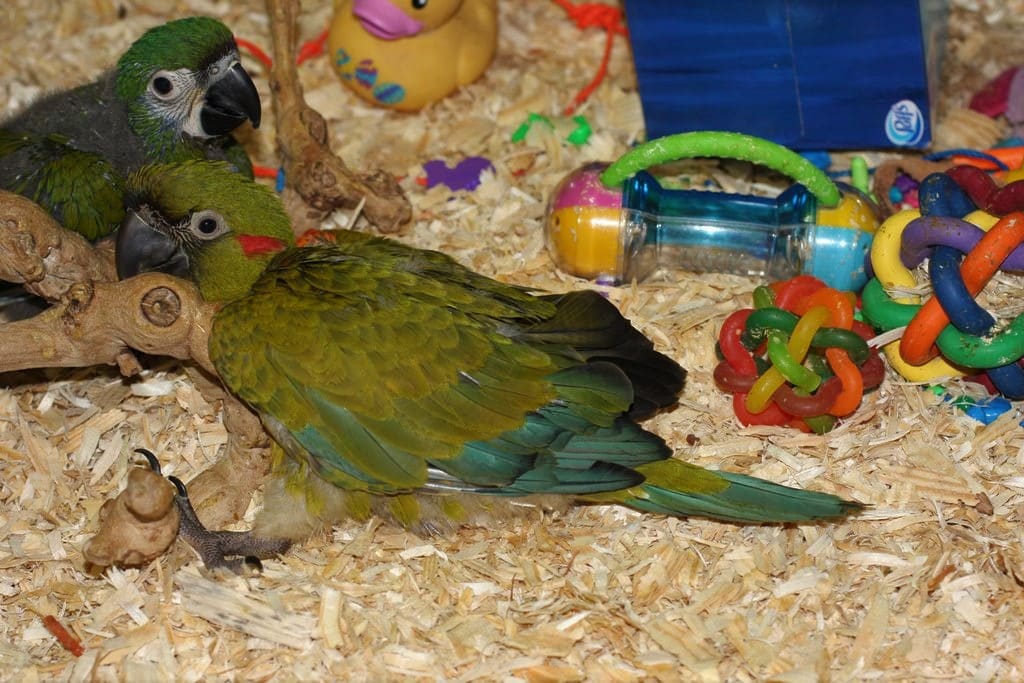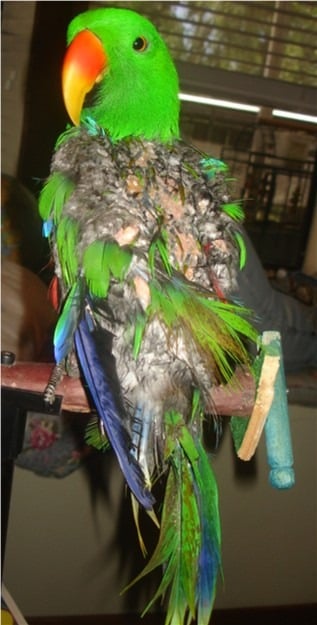-
Adopt
-
Veterinary Care
Services
Client Information
- What to Expect – Angell Boston
- Client Rights and Responsibilities
- Payments / Financial Assistance
- Pharmacy
- Client Policies
- Our Doctors
- Grief Support / Counseling
- Directions and Parking
- Helpful “How-to” Pet Care
Online Payments
Emergency: Boston
Emergency: Waltham
Poison Control Hotline
-
Programs & Resources
- Careers
-
Donate Now
Thinking about getting a bird as a pet? Before you do, take a moment to think about whether it’s the right choice for your lifestyle. Birds have unique needs, so it’s important to make sure you can meet them before bringing one into your home.
Parrots are amazing animals, but they require advanced care due to their social and intelligent nature. Before adopting a bird, do plenty of research. There are dozens of species of parrots available for adoption, each with its own characteristics and needs, ranging from the 20-gram parrotlet to macaws with nearly four-foot wingspans. So, adopting a bird is not a decision to rush into! We chatted with Dr. Anne Staudenmaier, a veterinarian at MSPCA-Angell’s Avian and Exotics service, who’s an expert in caring for birds, especially parrots.
What’s a healthy diet for a parrot?
“Contrary to popular opinion, most parrots should not have a diet of seeds,” explained Dr. Staudenmaier. “While a bird’s diet requirements vary from species to species (and certain parrots require very specialized diets, like nectar for lorikeets and lories), overall, the major component of the  diet should be a well-made pellet, comprising roughly 60% of the diet.” Bird-safe fresh veggies (NEVER avocadoes, garlic, or onions) and fruit should make up about 30% to 35% of the diet, and the “junk food” like seeds (which are the ice cream and Big Macs of the bird world), should only make up about 5% to 10% of the diet.
diet should be a well-made pellet, comprising roughly 60% of the diet.” Bird-safe fresh veggies (NEVER avocadoes, garlic, or onions) and fruit should make up about 30% to 35% of the diet, and the “junk food” like seeds (which are the ice cream and Big Macs of the bird world), should only make up about 5% to 10% of the diet.
Should you keep your bird in a cage?
All birds have the potential to wander the house while you’re away, so birds must have a cage to sleep in when not being supervised. “The cage should be big enough to ideally allow at least short bouts of flight and, at a minimum, big enough to allow several perches of varying heights, different toys and enrichment items, and enough room to extend the wings fully,” said Dr. Staudenmaier. While cages are necessary when unsupervised, it is vital to remember that — like a bedroom is for us — the bird should not always be in there. “Allowing access to a space big enough for flight and interaction with family members is essential for birds’ heart and mental health and should not be ignored,” added Dr. Staudenmaier.
Is it necessary to socialize your pet parrot?
Almost every parrot species is social, and in the wild, they can exist in flocks numbering from just a few up to several hundred. Socialization is a critical component of mental and behavioral health in parrots and can also prevent inappropriate mate relationships with humans. Dr. Staudenmaier advises that you slowly and quietly introduce new family members and reward the bird for positive interactions (starting with short interactions and working up to longer sessions), which often works well once the bird has settled in.
critical component of mental and behavioral health in parrots and can also prevent inappropriate mate relationships with humans. Dr. Staudenmaier advises that you slowly and quietly introduce new family members and reward the bird for positive interactions (starting with short interactions and working up to longer sessions), which often works well once the bird has settled in.
This doesn’t mean that you can’t or shouldn’t have a bird if you live alone — instead, it means that we sometimes need to get a bit more creative. Bringing friends over, playing videos of other birds or children’s shows, or even video-calling bird friends in different homes can promote normal socialization in parrots!
What specific veterinary care does a bird need?
Birds need regular veterinary care, just like dogs and cats. “Because they are prey species, birds do a very good job hiding signs of illness,” said Dr. Staudenmaier. Getting established with a veterinarian who is well-versed in avian medicine and coming in for yearly exams can sometimes help find more insidious issues before they become advanced. These exams can also be beneficial in discussing signs to monitor at home.
What are some common medical conditions?
Birds can contract many of the same diseases as dogs, cats, and even people. They are especially prone to respiratory infections due to their respiratory tract’s excellent ability to concentrate anything in the air and trauma, but GI disease is also commonly seen.
 As birds age, atherosclerosis, heart disease, liver disease, arthritis, and cancer increase in frequency, as seen in other animals, while genetics play a significant role in these diseases, exercise and a good diet can help reduce the risk.
As birds age, atherosclerosis, heart disease, liver disease, arthritis, and cancer increase in frequency, as seen in other animals, while genetics play a significant role in these diseases, exercise and a good diet can help reduce the risk.
Finally, mental health disorders, like feather destructive behavior (or feather picking), self-trauma, and other anxiety-like disorders seem to be more common in parrots than in some other animals — these can be complicated and frustrating to treat but are no less important than diseases of different organs.
What sort of exercise and enrichment should you provide for your pet bird?
Because of their intelligence and predilection for atherosclerosis (similar to people), exercise and enrichment are essential in birds. Studies have shown that exercise can reduce bird circulating cholesterol levels — a significant risk factor in birds, just like in people. “Flying is the best form of exercise, but if a bird isn’t flighted due to injury or safety reasons, then encouraging a bird to flap during gentle up-and-down movement on your arm or having them climb on a birdy “jungle gym” can also help,” suggests Dr. Staudenmaier.
Mental enrichment is also incredibly essential to birds. Parrots will spend over 50% of their day foraging for food in the wild. Since they don’t need to spend even a quarter of this on finding food in captivity, giving them a wide range of toys can help meet this need. Different categories of toys include “foot” toys, “beak” toys, and “foraging” toys. These can be purchased online or at certain pet stores or handmade from bird-safe materials at home. Check out websites like Lafeber.com, or your primary veterinarian may have handouts on enrichment. Some birds can be afraid of new things (known as “neophobia”), so you may need to introduce new toys slowly into their environment.
Are there any other factors to consider when dealing with a pet bird?
Birds are susceptible to certain toxins but in much smaller amounts than other animals. This, combined with their intelligence and knack for getting places they often shouldn’t due to flying, means that if you plan on getting a bird, you may need to adjust your house and living space.
Due to their specialized respiratory tract, airborne toxins are hazardous to birds. Therefore, nonstick Teflon pans, cigarettes, candles, and aerosols should ideally not be used in the household. “If birds chew on walls, window sills, calking, or doors, especially in older houses, they can expose themselves to lead or zinc and develop heavy metal toxicity,” said Dr. Staudenmaier.
Finally, care must be taken with toxic foods like avocados, garlic, onions, alcohol, chocolate, and coffee, as birds can get to them if they are left out on counters (some birds can even open particular doors).
x
Birds are incredibly smart and loyal companions but require specialized care. If done right, they can make amazingly rewarding pets, but the decision to adopt a bird should be made only after careful research and consideration.




